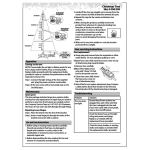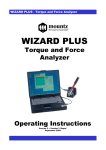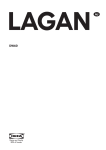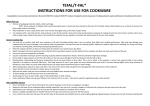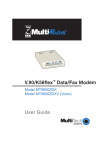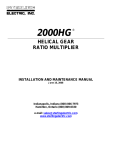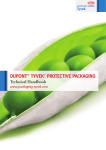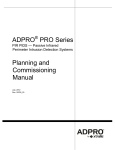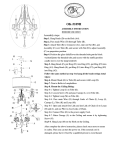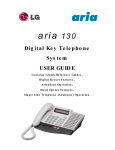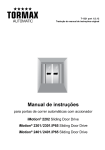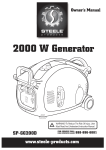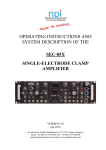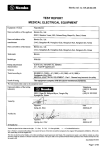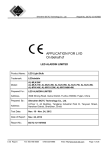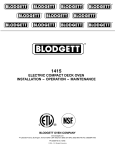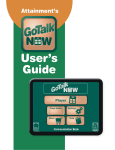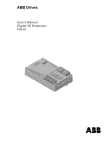Download TEST REPORT
Transcript
TEST REPORT Luminaires Part 1: General requirements and Tests Part 2: Particular requirements Section 4: Portable general purpose luminaires Report Reference No: T1321-21-12 Tested by: Urs Wyttenbach Approved by: Dr. F. Stucki Date of issue: 09 July 2012 Number of pages: 31 pages Testing Laboratory: QUINEL AG Address: Grundstrasse 2 CH-6343 Rotkreuz S T S Schweizerischer Prüfstellendienst Service Suisse d' essai Servizio di prova in Svizzera Swiss testing service Testing location: Rotkreuz Applicant’s name: OEE Odermatt Electronic Engineering, Mr Marco Odermatt Address: Steinersmatt 28, CH-6370 Stans Manufacturer's name: OEE Odermatt Electronic Engineering Address: Steinersmatt 28, CH-6370 Stans STS 037 Test specification Standards: EN 60598-1:2008+A11:2009, EN 60598-2-4:97 IEC 60598-1:2008, IEC 60598-2-4:97 Test procedure: Type testing Deviation of standard or procedure: none luminaire under test Description: Portable floor lamp with infrared detector to be put under a bed Trademark: OEE Model and/or type reference: Luna Rating(s): 230V, 50Hz, max. 53W, class II Date of receipt of luminaire: 20 April 2012 Summary of testing: passed Copy of the type label QUINEL page 2 of 31 Report reference No: T1321-21-12 Test verdicts: - test item does not apply to the tested object: N - test item meets the requirement: P - test item does not meet the requirement: F - test item not checked: -- General remarks: For the acceptance of the components see Table 1 "Safety relevant components" The test results presented in this Test Report relate only to the tested luminaire(s). This Test Report has to be read together with the standards. This Test Report shall not be reproduced except in full. Remarks: The electronic part (on PCB) has been tested by simulating possible fauts following EN 61347-1. The enclosure is mounted with pins and then glued. For the assessment and tests used documents provided by the applicant or manufacturer - Montageanleitung / Assembly Instructions by the manufacturer - Certificates and specification of components and plastic enclosure (see Table "Safety relevant components") - Circuit diagram of electronic circuit - Lay-out of PCB QUINEL page 3 of 31 Report reference No: T1321-21-12 Clause Requirement 2 CLASSIFICATION 2.2 Type of protection against electric shock: class II 2.3 Degree of protection against ingress of water, dust and solid objects: IP20 2.4 Material of supporting surface: 2.5 Result / Remark - Luminaires suitable for direct mounting on normally flammable surfaces: No symbol required yes - Luminaires not suitable for direct mounting on normally flammable surfaces: symbol required no Verdict Circumstances for use: - Luminaire for normal use: no symbol required yes - Luminaire for rough service: symbol required no Additional requirements for EN 60598-2-4 portable floor and table luminaires assigned to luminaires for direct mounting on normally flammable surfaces only yes 3 MARKING (type label) 3.2 Mandatory markings P Position of the marking P Format of symbols/text P Mark of origin (trade mark, the manufacturer's identification mark or the name of the responsible vendor) P Rated voltage. For tungsten filament lamps only if the rated voltage is different from 250V∼ P Portable cl. III luminaires marked outside N 3.2.3 ta if other than 25°C N 3.2.4 Symbol for class II luminaires where applicable P portable class II luminaires with non detachable flexible cord symbol outside P symbol not applied to semi-luminaires N 3.2.5 Symbol for cl. III luminaires N 3.2.6 IP numbers (IP20 on ordinary lum. not required) N 3.2.7 Model number or type reference P 3.2.8 Rated wattage or the designation as indicated on the lamp data sheet of the type or types of lamp for which the luminaire is designed P Where the lamp wattage alone is insufficient, the number of lamps and the type shall also be given N Luminaires for tungsten filament lamps shall be marked with the maximum rated wattage and number of lamps N Where applicable, the relevant symbol for luminaires not suitable for direct mounting on normally flammable surfaces. See Table N.1 N The symbol shall be explained on the luminaire or in the manufacturer’s instructions provided with the luminaire N The minimum size of the symbol shall be 25 mm for each side N 3.2.1 3.2.2 3.2.9 QUINEL page 4 of 31 Report reference No: T1321-21-12 Clause Requirement 3.2.10 Information concerning special lamps (e.g. high pressure sodium lamps) N 3.2.11 Symbol for luminaires for lamps of similar shape to "cool beam" lamps but where the use of a dichroic reflectorized "cool beam" lamp might impair safety N Except for type Z attachments, termination shall be marked to identify live, neutral and earth in case of connection of the luminaire to the supply mains to ensure safe and satisfactory operation N 3.2.12 Result / Remark Verdict Symbols, where applied, according to IEC 60417 P Earthing terminal marked by symbol of IEC 60417 only N Leads (tails) used for the connection to extra low voltage DC supply, shall be colour coded red for positive termination and black for negative termination. Fixed termination marked with "+" and "-" sign N Luminaires with non-detachable flexible cords without a plug shall include with the manufacturer's instructions any information necessary to ensure safe connection N 3.2.13 Symbol for minimum distance from lighted objects on the luminaire or in the instructions if necessary N 3.2.14 Symbol for rough service luminaires if applicable N 3.2.15 Symbol for bowl mirror lamps N 3.2.16 "Replace any cracked protective shield" or symbol for luminaires incorporating a glass protective shield N 3.2.17 Max. number of luminaires that may be interconnected or max. current that may be drawn by means of couplers provided for looping-in connections to the mains supply. For fixed luminaires alternatively within the installation instructions N 3.2.18 Warning symbol or notice for luminaires with ignitors and double-ended high pressure discharge lamps and luminaires with double-capped Fa8 tabular lamps if voltage > 34 Vp a) Warning symbol IEC 60417-5036 visible during replacement of the lamp. Symbol explained on luminaire or instructions, or N b) Warning notice near to the holder of a replaceable ignitor: " Attention, remove...." N 3.2.19 Symbol for luminaires which are designed for use with self-shielded tungsten halogen lamps only N 3.20 Where necessary, the means of adjustment where not obvious, needs to be identified N 3.21 The relevant symbol (see Figure 1) for luminaires not suitable for covering with thermally insulated material. The symbol shall be explained on the luminaire or in the manufacturer’s instructions provided with the luminaire. See Table N.1. The minimum size of the symbol shall be 25 mm for each side N 3.22 Symbol, if applicable, for luminaires with internal replaceable fuses N 3.3 Additional information: Acceptable language of instructions N 3.3.1 Combination luminaires N 3.3.2 Nominal frequency in Hz N QUINEL page 5 of 31 Report reference No: T1321-21-12 Clause Requirement 3.3.3 Operating temperature Tw, Tc, insulation etc. N 3.3.4 In case a luminaire is only suitable for direct mounting on non-combustible surfaces and the relevant symbol is not applied, a warning notice shall be attached to the luminaire or given in the manufacturer’s instructions explaining that the luminaire can under no circumstances be mounted on normally flammable surfaces N 3.3.5 Wiring diagram N 3.3.6 Special conditions in case of looping-in N 3.3.7 Metal halide lamp luminaire – warning about shield N 3.3.8 Limitation for semi-luminaires N 3.3.9 Power factor and supply current N 3.3.10 Suitability for use "indoors" N 13.3.11 Range of lamps if used with remote control gears N 3.3.12 Clip-mounted luminaire – warning N 3.3.13 Specifications of all protective shields N 3.3.14 Symbol for nature of supply N 3.3.15 Rated current of socket outlet N 13.3.16 Rough service luminaire N 3.3.17 Information about replacement of flexible cord in mounting instruction for X, Y and Z attachment 3.3.18 Non-ordinary luminaires with PVC cable N 3.3.19 Protective conductor current <10mA and permanent connection protective current clearly stated in manufacturer's instructions N Wall mounted and adjustable luminaires not intended to be mounted within arms reach shall be provided with information to advise their correct installation, i.e. “Only to be installed outside arms reach” N 3.3.101 terminal block not delivered with luminaire (tails) N 3.4 Test with water P Test with hexane P Legible after test P Label attached P 3.3.20 Result / Remark type Z-attachment Verdict P 4 CONSTRUCTION 4.2 Components intended to be replaceable shall be so designed that there is sufficient space to permit replacement without difficulty and without impairing safety P Wireways smooth and free from sharp edges, burrs, flashes etc. P Metal set screws shall not protrude into wireways P 4.3 4.4 Lampholders 4.4.1 Integral lampholder N 4.4.2 Wiring connection of integral lampholders N 4.4.3 Lampholder for end-to-end mounting N 4.4.4 Positioning of lampholders N 4.4.5 Peak pulse voltage of luminaires with ignitors N 4.4.6 Centre contact of Edison lampholders N 4.4.7 Rough service luminaires N QUINEL page 6 of 31 Report reference No: T1321-21-12 Clause Requirement 4.4.8 Lamp connectors N 4.4.9 Caps or bases developed for ELV not permitted for Urated > AC 50V N Luminaires intended for use with GU10 lamps only (with aluminised reflector) shall be provided with GU10 lamp holders only. N 4.5 4.6 Result / Remark Verdict Starter holders Starter holders in luminaires other than class II shall accept starters which comply with IEC 60155 N For class II luminaires where the starter can be touched with the test finger when the luminaire is fully assembled or open for the replacement of lamps or starters, the starter holder shall be one accepting only starters complying with the requirements for starters for class II luminaires given in IEC 60155 N If provided with connecting leads (tails) requiring a separate terminal block for the connection to the fixed wiring, adequate space for this terminal block shall be provided within the luminaire, or within a box delivered with the luminaire, or specified by the manufacturer N 4.7 Terminals and supply connections 4.7.1 In portable luminaires and in fixed luminaires that are frequently adjusted, adequate precautions shall be taken to prevent metal parts from becoming live due to a detached wire or screw. This requirement applies to all terminals (including supply terminals) P One of the following methods is deemed efficient to prevent a wire form becoming detached: 4.7.2 4.7.3 a) wires are retained by a cord anchorage adjacent to the terminals P b) conductor is clamped by a spring type screwless terminal N c) the wire conductor is anchored to the tag before soldering, unless breakage close to the soldering place is likely to occur as a result of vibration N d) wires are twisted together in a reliable manner N e) wires are fastened together by insulation tape, sleeves, or the like N f) the wire conductor is inserted into a hole in a printed board, bent and soldered, the hole having a diameter slightly greater than the conductor N g) the wire conductor is securely wrapped around the terminal by means of a special tool N h) the wire conductor is crimped to the terminal by means of a special tool N i) insulating lining in the enclosure N j) enclosure of insulating material P k) other method(s): N Supply terminals shall be located or shielded in such a Inspection and test way that, if a wire of a stranded conductor escapes from a terminal when the conductors are fitted, there is no risk of contact between live parts and metal parts which can be touched with the standard test finger. Inspection and "8mm-test" P Terminals for supply conductors P QUINEL page 7 of 31 Clause Requirement 4.7.3.1 Welding method and material Report reference No: T1321-21-12 Result / Remark Verdict Conductor stranded or solid wire of copper. For thin wires, a ferrule may be used N Spot welding only (other methods under consideration) N Welding of wire and plate is allowed, but welding of wires together is not allowed N Welded connections in type Z attachments only N Welding connections shall withstand mechanical, electrical and thermal tests: a) mech. test. 15.8.2 (if cord anchorage, no test required) N b) electrical test: 15.9 N c) heat test: 15.9.2.3 and 15.9.2.4 N Terminals, other than those for supply connection, which are not covered by separate standards for components, shall comply with the requirements of sections 14 and 15 N Terminals for lampholders, switches and similar parts used for multiple connection of internal wiring shall have dimensions adequate for the purpose and shall not be used for the connection of external wiring N If the external wiring or supply cable is unsuitable for the temperatures reached inside the luminaire, either a connection shall be provided at the point of entry of the external wiring into the luminaire for the use of heat-resistant wiring after this point, or heat-resisting parts shall be supplied with the luminaire to cover the part of the wiring placed inside it, which exceeds the wiring temperature limit. See also 12.4.2c). Max. 120°C N 4.7.6 Multi-pole plug: unsafe connections, e.g. by shifting the plug position, shall be prevented N 4.8 Switches: 4.7.4 4.7.5 - adequate rated N - adequate fixing, secured against rotation and removing by hand N - switches in flexible cables or cords and switched lampholders shall not be used in luminaires other than ordinary, unless the degree of protection against dust, solid objects or moisture of the switch is in accordance with the classification of the luminaire N - polarized supply, wired into the live side N - Electronic switches, when incorporated or supplied with the luminaire shall comply with the requirements of EN 61058-1 N 4.9 Insulating lining and sleeves 4.9.1 Reliably retained in position N 4.9.2 Insulated linings, sleeves and similar parts shall have adequate mechanical, electrical and thermal strength N Compliance according to manufacturer's specifications N Inspection and manual tests N Electric strength test N Insulation resistance and electric strength measured after ageing test. Temperature (°C): N QUINEL page 8 of 31 Report reference No: T1321-21-12 Clause Requirement 4.10 Double and reinforced insulation 4.10.1 For metal encased luminaires, contact between: - mounting surfaces and parts with basic insulation only, and - accessible metal parts and basic insulation, shall be effectively prevented. (Applicable for internal, external and fixed wiring of installation) N Class II fixed luminaires shall be so designed that the required degree of protection against electric shock is not impaired as a result of the installation of the luminaire N No capacitors between live parts and body of metal encased class II luminaires (exception next line) N Interference suppression capacitors according to EN 60384-14 and method of connection in accordance with EN 60065, 8.6/14.2.1b) N Any assembly gap with a width greater than 0.3mm in supplementary insulation shall not be coincidental with any such gap in basic insulation, nor shall any such gap in reinforced insulation give straight access to live parts N Openings in double or in reinforced insulation shall not give straight access to live parts, so that the live parts can be touched with the conical pin of test probe 13, Figure 9 of IEC 611032 N Parts which serve as supplementary or reinforced insulation shall either be fixed or they shall be unable to be replaced in an incorrect position N Where sleeving is used as supplementary insulation on internal wiring, and where insulated linings are used in lampholders as supplementary insulation on external or internal wiring, the sleeving and lining shall be retained in position by positive means N 4.10.2 4.10.3 4.11 Electrical connections and current-carrying parts 4.11.1 Contact pressure not transmitted through insulating material, unless there is sufficient resilience in the metallic parts to compensate for any possible shrinkage of the insulating material 4.11.2 4.11.3 Result / Remark Verdict P Screws: Self-tapping screws shall not be used for the connection of current carrying parts, unless they clamp these parts directly in contact with each other, and are provided with a suitable means of locking N Self-tapping screws may be used to provide earth continuity, if it is not necessary to disturb the connection in normal use, and at least two screws are used for each connection N Thread-cutting screws shall not be used for the interconnection of current-carrying parts of metal which is soft or liable to creep, such as zinc or alu N Screws and rivets which serve as electrical as well as mechanical connections shall be locked against loosening. Spring washers may provide satisfactory locking. For rivets, a non-circular shank or an appropriate notch may be sufficient N QUINEL page 9 of 31 Report reference No: T1321-21-12 Clause Requirement Result / Remark 4.11.4 Current-carrying parts shall be of copper, an alloy containing at least 50% copper, or a material having at lest equivalent characteristics, e.g. aluminium P Current-carrying parts shall be resistant to, or adequately protected against, corrosion P 4.11.5 Current-carrying parts shall not be in direct contact with the mounting surface or wood P 4.11.6 Electro-mechanical contact systems N 4.12 Screws and mechanical connections and glands 4.12.1 Withstand mechanical stress in normal use, if safety relevant luminaire is glued Verdict N Screws not made of a material which is soft or liable to creep as zinc, some grades of aluminium and several thermoplastics N Screws which are operated for maintenance purposes shall not be of insulating material if their replacement by a metal screw could impair supplementary or reinforced insulation N Torque tests N 4.12.2 Screws transmitting contact pressure and < 3 mmØ shall screw into metal 4.12.4 Screwed and other fixed connections between different parts of luminaires shall be made in such a way that they do not work loose through such torsion, bending stresses, vibration, etc., as may occur in normal use. Fixed arms and suspension tubes shall be securely attached; e.g. soldering, welding, lock nuts, set screws N Compliance torque test N Test: Lampholder; torque (Nm): approved terminal block glued P N Test: Push-button switches; torque 0.8 Nm N 4.12.5 Test: Screwed glands: N 4.13 Mechanical strength 4.13.1 Luminaires shall have adequate mechanical strength and be so constructed as to be safe after such rough handling as may be expected in normal use P Impact tests see Table 4.13.1 4.13.2 Metal parts enclosing live parts shall have adequate mechanical strength at least basic insulation 4.13.3 Test with unjointed straight test finger: 4.13.4 4.13.6 P N - During the test, metal parts shall not touch live parts N - After the test, covers shall not be excessively deformed and the luminaire shall continue to meet the requirements of section 11 N Rough service luminaires shall have protection against ingress of solid objects and moisture of at least IP54 N a) fixed N b) hand-held N c) delivered with a stand N d) for temporary installations and suitable for mounting on a stand N Tumbling barrel test for plug-ballast/transformer and mains socket-outlet-mounted luminaires N QUINEL page 10 of 31 Report reference No: T1321-21-12 Clause Requirement 4.14 Suspensions and means of adjustment 4.14.1 Mechanical suspension shall have adequate factors of safety: 4.14.2 Result / Remark Verdict Test A for suspended luminaires: four times the weight added N Test B for rigid suspension luminaires: torque 2.5 Nm N Test C for rigid suspension brackets N Test D for track-mounted luminaires N Test E for clip-mounted luminaires N Manufacturer provides guidance and/or means for safe installation and use N Load to flexible cables or cords of luminaires suspended by flexible cable or cords Mass of the luminaire suspended by flexible cords shall not exceed 5kg N Stress in conductors shall not exceed 15N/mm² N Where a luminaire >5kg, so suspended that no tension to conductors N Semi-luminaires: mass and bending moment N a)Adjusting devices (joints, hoisting devices, adjusting brackets, telescopic tubes etc) shall be so constructed that cords or cables are not pressed, clamped, damaged or twisted along the longitudinal axis by more than 360° during operation N - flexing test; number of cycles (1500/150/45): N - not more than 50% of the strands broken, no serious damage to the insulation N - electric strength test afterwards N b) Luminaires....shall allow the operation of its intended function without impairing the stability of the luminaire or causing deformation of any part of the construction, nor cause injury due to temperatures above those specified in Table 12.1. N c) For luminaires....shall comply with the temperature limits for the means of adjustment, as specified in Table 12.1. The same temperature limits apply also to any means of adjustment which are lit after the positioning of the luminaire light beam aperture N Cords or cable passing through telescopic tubes shall not be fixed to the outer tube. Means shall be provided for avoiding strain on the conductors at the terminals N 4.14.5 Guide pulleys N 4.14.6 Plug-ballast/transformers and mains socket-outletmounted luminaires shall not impose undue strain on socket-outlets N 4.14.3 4.14.4 4.15 Flammable materials: 4.15.1 Covers, shades and similar parts not having an insulation function, and which do not withstand the 650°C glow-wire test of 13.3.2, shall be adequately spaced from any heated part of the luminaire which could raise the material to its ignition temperature. These parts made of flammable material shall have suitable fastenings or supporting devices to maintain this spacing. plastic enclosure: IEC 60695-2-13 / UL94: V-0 IEC 60695-2-11: GWT: 960°C - glow-wire test 650°C (13.3.2) passed P - protected by a temperature sensing control N QUINEL Clause 4.15.2 page 11 of 31 Requirement Report reference No: T1321-21-12 Result / Remark Verdict - spacing ≥ 30 mm or N - screen and spacing 3mm N - screen withstanding needle flame test (13.3.1) N - screen dimensions, no wholes N - effective barrier to burning drops, no screen N No fiercely burning material (e.g. celluloid) used P Luminaires made of thermoplastic materials shall withstand temperature rises due to fault conditions in ballasts/transformers and electronic devices, so that no danger occurs when mounted as in normal use P This requirement shall be met by one of the following measures: 4.16 a) construction P b) temperature sensing control to limit the temperature of the ballast, transformer, electronic device N c) Thermoplastic materials suitable for the maximum surface temperature permitted by use of thermally protected ballasts complying with the relevant auxiliary standard P Luminaires for mounting on normally flammable surfaces For luminaires incorporating lamp control gear, compliance with this requirement shall be met by spacing the lamp control gear from the mounting surface in accordance with 4.16.1, or by the use of thermal protection in accordance with 4.16.2, or by compliance with 4.16.3. 4.16.1 4.16.2 N The lamp control gear shall be spaced from the mounting surface by a minimum distance of either: a) 10/3mm, or N b) 35mm N The luminaire shall incorporate a temperature sensing control to limit the temperature of the mounting surface of the luminaire to a safe value. This temperature sensing control may be either external to the lamp controlgear or be part of a thermally protected lamp controlgear in accordance with the relevant auxiliary standard. N The temperature sensing control may be either a selfresetting thermal cut-out, a manual reset thermal cutout or a thermal link (a thermal cut-out which operates only once and then requires replacement). N A temperature sensing control external to the lamp controlgear shall not be of the plug-in type or an otherwise easily replaceable type. It shall be kept in a fixed position with regard to the ballast/transformer. N Compliance is checked by inspection and by the test of 12.6.2. N Luminaires incorporating ballast/transformer(s) without the symbol for thermally protected ballasts or with a marked value above 130 °C shall comply with the requirements of 4.16.1 or 4.16.3. N QUINEL page 12 of 31 Clause Requirement 4.16.3 If the luminaire does not comply with the spacing requirements of 4.16.1, and does not incorporate thermal cut-outs in accordance with 4.16.2, it shall be so designed that it satisfies the test of 12.6 4.17 Report reference No: T1321-21-12 Result / Remark Verdict N Drain holes Drain holes for IP X1 to X4 if water can accumulate N Clearance at least 5 mm from mounting surface N Watertight luminaires (IPX6, IPX7) shall have no provision for draining N 4.18 Resistance to corrosion: 4.18.1 Ferrous parts except for IPX0 shall be adequately protected against rusting. Compliance is checked by inspection and/or by the test of 4.18.1 N - contacts and other parts made of rolled copper or copper alloy sheet shall be free from stress corrosion, if safety relevant N 4.18.3 - except for IP20, parts of aluminium or aluminium alloy shall be resistant to corrosion, if safety relevant N 4.19 Ignitors compatible with ballast N 4.20 Rough service luminaires shall have adequate resistance to vibrations N 4.21 Protective shield Luminaires designed for tungsten halogen lamps and metal halide lamps shall be fitted with a protective shield. For tungsten halogen lamps, the shield shall be of glass Luminaires with self-shielded lamps only are exempt from this requirement, but shall be marked with the appropriate symbol (see Figure 1) 4.18.2 4.21.1 4.21.2 N N Parts of the lamp compartment shall be so designed that particles from a shattering lamp cannot impair safety N 4.21.3 No direct path N 4.21.4 Inspection and/or tests: - Impact test on shield (4.13.1) N - Glow-wire test on lamp compartment (13.3.2) N Luminaires shall not incorporate attachments to lamps which might cause overheating or damage to the lamps, lamp caps or holders, luminaires or attachments N 4.23 Semi-luminaires shall comply with all relevant requirements for class II luminaires N 4.24 Luminaires shall not emit excessive UV radiation N Metal halide lamps with adequate protective shield N No sharp points or edges that could, during installation, normal use, or maintenance, create a hazard for the user P 4.22 4.25 4.26 Short circuit protection (class III luminaires) 4.26.1 Adequate means shall be provided to prevent the impairing of safety due to unintended short-circuiting of uninsulated accessible SELV parts of opposite polarity N QUINEL Clause page 13 of 31 Requirement Report reference No: T1321-21-12 Result / Remark Verdict If supplied from a separate unspecified SELV supply: - at least one conductor insulated, or N - if uninsulated, max. VA output declared and SELV source defined in user's manual and test 4.26.2 N 4.26.2 Short-circuit test with test chain N 4.27 Terminal blocks with integrated screwless earthing contacts Terminal blocks with integrated screwless earthing contacts shall be mounted in accordance with the requirements specified by the manufacturer with reference to Annex V of this standard. N Additional requirements for EN 60598-2-4 Portable general purpose luminaire 4.6.1 The insulation of flexible cables and cords shall be unlikely to be damaged when moving or adjusting the luminaire or when placing it on its support P Wiring shall be fixed by means of wire carriers, clips or similar devices of insulating material, at all places where it might otherwise rub against metal parts in the normal movement of the luminaire, if such rubbing will impair safety. N 4.6.3 Adequate stability. Test on an inclined surface (at an angle of 6°) P 4.6.4 Candlestick luminaires shall be provided with a switch N The switch with E5 and E10 lampholders shall switch all lamps on and off simultaneously N Switch shall be part of luminaire or in the cord within 300mm of the luminaire N E5 lampholders: Rated voltage ≤ 25V, max. 100W N E10 lampholder 60V or 250V, max. 100W N 4.6.2 5 EXTERNAL AND INTERNAL WIRING 5.2 Supply connection and external wiring 5.2.1 5.2.2 Means of connection: Portable luminaires intended for wall mounting and incorporating a junction box and cord anchorage may be delivered without a non-detachable flexible cable or cord, if instructions for mounting are enclosed with the luminaire. N Luminaires declared by the manufacturer to be suitable for use outdoors shall not have PVC-insulated external wiring N Supply cords used as a means of connection to the supply, when supplied by the luminaire manufacturer, shall be at least equal in their mechanical and electrical properties to those specified in IEC 60227 or HD21and IEC 60245 or HD22, as indicated in Table 5.1, and shall be capable of withstanding, without deterioration, the highest temperature to which they may be exposed under normal conditions of use. P Type of cable: 2 H03VVH2-F 2x0.75mm , 2m Nominal cross-sectional area of the conductors shall be not less than: 2 0.75mm for ordinary luminaires 2 1.0mm for other luminaires P N QUINEL Clause page 14 of 31 Requirement Report reference No: T1321-21-12 Result / Remark 0.5 mm for portable luminaires ≤ 1kg, ≤ 2.5A, ≤ 2m length of flexible cord. See also 4.10 2) of EN 60598-2-4 Verdict 2 Nominal cross-sectional area (mm²): N 2x0.75mm 2 2 At least 1.5 mm if provided with 10/16A socket-outlet P N 5.2.3 If provided with a non-detachable flexible cable: Type of attachment; X, Y or Z Z attachment 5.2.5 Type Z-attachment: no screwed connections luminaire is glued 5.2.6 Cable entries: P N - suitable for introduction P - adequate degree of protection against dust and water P 5.2.7 Cable entries through rigid material have smoothly rounded edges of min. radius 0.5mm P 5.2.8 Flexible cables or cord entering luminaires of class II or adjustable or portable luminaires through accessible metal parts shall be provided with a tough bushing of insulating material having smoothly rounded edges and so fixed that it cannot easily be removed. No rubber. N If tubes or other guards are provided for the protection of flexible cables or cords at the entry to the luminaire they shall be of insulating material N Helical metal springs and similar components not acceptable as guards N Bushings which screw into the luminaire shall be locked in position. If bushings are fixed with an adhesive, it shall be of the self-hardening resin type. N 5.2.9 5.2.10 Cord anchorage: Luminaires provided with a supply cord or other external flexible cable shall have a cord anchorage 5.2.10.1 P - relieved from stain P - no twisting P - covering protected from abrasion P - clear how to be effective P - no mechanical or thermal stress P - no tying of cables into knots or tying the ends with strings, etc. P - not possible to push cord into the luminaire so that it is subjected to mechanical or thermal stress P - insulating material or lining P Cord anchorage for type X attachment a) at least one part fixed Exception: 4.10 1) of EN 60598-2-4 N b) suitable for different types of cable or cord N c) no damaging of the cable N d) whole cable can be mounted N e) no touching of clamping screws N f) metal screw not directly on cable N g) replacement without special tool N QUINEL Clause page 15 of 31 Requirement Report reference No: T1321-21-12 Result / Remark Verdict Glands not used as anchorage in portable or adjustable luminaires unless they have provisions for clamping all types of cords N Labyrinth type anchorages permitted if it is evident how to be mounted (suitable marking) N 5.2.10.2 Adequate cord anchorage for type Y and type Z attachment 5.2.10.3 Tests: Z type - impossible to push cable into the luminaire P P - pull test: 25 times; pull (N): P - torque test: torque (Nm): P - displacement ≤ 2 mm P - no movement of conductors P - no damage of cable or cord P If external wiring passes into/within/through a luminaire, it shall comply with the appropriate requirements for internal wiring P 5.2.12 Looping-in terminals N 5.2.13 Wire ends not tinned unless a means is provided of ensuring that clamped connections cannot work loos owing to cold flow of the solder N Mains plug same degree of protection against electric shock and degree of protection against ingress of water and dust as the luminaire P Class III luminaire no mains plug N Appliance inlets shall comply with IEC 60320 N Appliance couplers for looping-in, if class I type, shall not accept class I plugs N Inter-connecting cables, if not made of standardized insulated and sheathed cables, shall consist of a defined assembly made by the luminaire manufacturer of wiring within a sleeve, tube or equivalent construction. N All luminaires intended to be connected to the supply via a socket outlet, shall be fitted with a plug in accordance with IEC 60083, or with regional or national standards where applicable, appropriate to the classification of the luminaire. N 5.2.11 5.2.14 5.2.16 5.2.17 5.2.18 5.3 Internal wiring 5.3.1 Suitable size and type, material capable of withstanding the voltage and the maximum temperature. See also section 12 no internal wiring except for the external flexible cord entering the luminaire P Through wiring: - if special cable or sleeves (e.g. high temperatures) are necessary, the through wiring shall always be factory assembled. See also 3.3.3 c) N - common type of insulation (PVC, rubber): if not assembled, sufficient information in manufacturer's instruction and way of mounting is clear N green-yellow for earth only N additional thermal test N QUINEL page 16 of 31 Clause Requirement 5.3.1.1 For wiring which is directly connected to the fixed wiring (e.g. via terminal block) and the disconnection from the mains is relied upon by the external protection device(s), the following is applicable: Report reference No: T1321-21-12 Result / Remark Verdict - For normal operating currents higher than 2 A: - nominal cross-sectional area: min. 0.5 mm 2 N - for through wiring of fixed luminaires: 2 minimum. 1.5 mm N - nominal insulation thickness: min. 0.6 mm if PVC or rubber is used. N - For mechanical protected wiring carrying normal operating currents lower than 2 A: - nominal cross-sectional area: min. 0.4 mm 2 - nominal insulation thickness: min. 0.5 mm if PVC or rubber is used cord 2x 0.75mm 2 P P - The required mechanical protection is regarded to be adequate when extra insulation is added at the following places where the wire insulation may be damaged: 5.3.1.2 - in small openings of pipes when, during production, the wires are slid through, N - when bending wires closely around metal not specially treated to produce smooth edges. N Wiring connected to fixed wiring via internal currentlimiting device and limiting the current to max. 2 A, e.g. lamp current device, circuit cut-outs, fuses, isolating transformers, the following is applicable: - Adequate cross-sectional area: N - Adequate insulation thickness: N Double or reinforced insulation used in class II luminaire where the internal wiring is hazardous live and can touch accessible metal parts N 5.3.1.4 Conductors without insulation N 5.3.1.5 SELV current-carrying parts: if insulation is applied, tested as mentioned in section 10 N 5.3.1.6 When insulation materials are used which have insulating or mechanical properties higher than PVC or rubber, an insulation thickness shall be selected which gives the same degree of protection N 5.3.1.3 5.3.2 5.3.3 Wiring so situated or protected that it cannot be damaged by - sharp edges, rivets, screws, etc. P - moving parts of switches, joints, raising and lowering devices, telescopic tubes, etc. N - no twisting over 360° P Internal wiring of luminaires of class II, adjustable or portable luminaires other than those for wall mounting, passing through accessible metal parts, the opening shall be provided with a tough bushing of insulating material having smoothly rounded edges and so fixed that it cannot easily be removed. No rubber or similar. N QUINEL Clause 5.3.4 5.3.5 5.3.6 5.3.7 page 17 of 31 Requirement Report reference No: T1321-21-12 Result / Remark Verdict If the cable entry openings have smoothly rounded edges and the internal wiring is not required to be moved in service, this requirement is met by the use of a separate protective sheath over a cable that has no special protective sheath, or by using a cable which incorporates a protective sheath N Joints and junctions provided with an insulating covering no less effective than the insulation of the wiring N Strain on internal wiring passing out of the luminaire: the requirements for external wiring apply. No application for ordinary luminaires if length is less than 80 mm N For luminaires other than ordinary, all wiring external to the enclosure shall comply with the external wiring requirements N Wiring of adjustable luminaires shall be fixed by means of wire carriers, clips or similar parts of insulating material at all places where it might otherwise rub against metal parts in the normal movement of the luminaire in such a way that the insulation may be damaged N The ends of flexible stranded conductors not tinned together unless a means is provided of ensuring that clamped connections cannot work loos owing to cold flow of the solder. Spring terminals ok. N 7 PROVISION FOR EARTHING 7.2.1 Metal parts of class I luminaires which are accessible when the luminaire has been mounted, or is opened for replacement of a lamp or replaceable starter or for cleaning purposes, and which may become live in the event of an insulation fault, shall be permanently and reliably connected to an earthing terminal or earthing contact N Metal parts of luminaires which may become live in the event of an insulation fault and which are not accessible when the luminaire has been mounted, but are liable to come into contact with the supporting surface, shall be permanently and reliably connected to an earthing terminal N The earthing connections shall be of low resistance N Self-tapping screws may be used to provide earthing continuity, provided that it is not necessary to disturb the connection in normal use and that at least two screws are used for each connection N Thread-forming screws may be used to provide earthing continuity if they comply with the requirements for screw terminals (section 14) N A thread forming screw used in a groove of a metallic material could provide earth continuity for a luminaire if all the tests required within EN 60598-1 regarding earthing connection were passed. See Figure 30 N QUINEL Clause page 18 of 31 Requirement Report reference No: T1321-21-12 Result / Remark Verdict For class I luminaires with detachable parts provided with connectors or similar connection devices, the earth connection shall be made before the currentcarrying contacts are made and the current-carrying contacts shall separate before the earth connection is broken N 7.2.2 Earth continuity in adjustable joints, telescopic tubes, etc. N 7.2.3 Inspection and test for 7.2.1 and 7.2.2 Resistance < 0.5 Ω tested with ≥10A, 1min. N 7.2.4 Compliance with 4.7.3 N Connection shall be adequately locked against accidental loosing N Loosen the clamping means by hand shall not be possible for screw terminals N Loosen the clamping means unintentionally shall not be possible for screwless terminals N 7.2.5 Earth terminal integral part of connector socket N 7.2.6 Earth terminal adjacent to mains terminals N 7.2.7 Other than ordinary luminaires: electrolytic corrosion of the earth terminal minimised N 7.2.8 Either the screw or the other part of the earth terminal shall be made of brass or other non-rusting metal or a material with a non-rusting surface and the contact surfaces shall be bare metal N Class II luminaire for looping-in N If a fixed connected class II luminaire has an earth connection for functional purposes, the functional earth circuit shall be separated from live pars or accessible metal parts by double or reinforced insulation N When a class I luminaire is supplied with an attached flexible cord, this cord shall have an earthing core coloured green-yellow N All internal or external conductors, which are identified by the green and yellow colour combination shall only be connected to an earthing terminal N For luminaires with supply cords, the arrangement of the terminals, or the length of the conductors between the cord anchorage and the terminals, shall be such that, should the cable or cord move out of the cord anchorage, the current-carrying conductor becomes taut before the earthing conductor. N 7.2.10 7.2.11 8 PROTECTION AGAINST ELECTRIC SHOCK 8.2.1 and Live parts not accessible when installed and wired as in normal use and opened for replacing lamps or 8.2.5 starters even if the operation cannot be achieved by hand P Basic insulated parts not used on the outer surface P No access to live parts with the standard test finger is permitted when the luminaire has been installed and/or assembled for normal use and, in addition, under the same conditions: P QUINEL Clause page 19 of 31 Requirement Report reference No: T1321-21-12 Result / Remark Verdict for portable luminaires and adjustable luminaires, no access to basic insulated parts with the standard test finger is permitted, and P for wall-mounted luminaires, within arms reach, there shall be no access to basic insulated parts from the outside of the luminaire by means of a Ø 50mm probe according to Figure 1 in IEC 61032 N Lampholders and starterholders, if used in portable luminaires and adjustable luminaires and if accessible as specified above, shall comply to the electrical strength test and creepage distance and clearance requirements for double or reinforced insulation P Basic insulation may be accessible when the luminaire is opened for lamp or starter replacement N If a component (e.g. EVG) intended for building-in is used on the outside of a fully assembled luminaire which can be touched by the 50mm sphere, it shall comply with the relevant requirements applied to an independent component (see 1.2.29) N Protection against electric shock shall be maintained for all methods and positions of installation in normal use with regard to the limitations indicated in the manufacturer's installation instructions, and for all adjustments of adjustable luminaires. Protection shall be maintained after removal of all parts which can be removed by hand, except lamps and the following parts of the lampholders: P a) For bayonet lampholders: 1) domes (terminal covers); N 2) skirts. N b) For Edison screw lampholders: 1) domes (terminal covers) for cord grip types only; N 2) outer shells. N Class I and class II luminaires intended for tubular tungsten filament lamps having a cap/base at each end shall incorporate a means of automatic doublepole disconnection operative when the lamp is being changed. This requirement does not apply if the relevant cap and holder combination(s) is (are) covered by standards which incorporate special requirements with regard to accessibility of live parts which may cause an electric shock. N Lacquer, enamel, paper, and similar materials not used as an insulation against electric shock or short circuit P Luminaires with ignitors intended for use with double ended high pressure discharge lamps shall be tested according to Figure 26 N If greater than 34Vp Ignitor only active if lamp is fully inserted, or warning according to 3.2.18 a) or b) is fitted N Luminaires for double capped Fa8 tabular lamps shall comply with the marking requirement of 3.2.18 N 8.2.2 and Portable luminaire in most unfavourable position of the 8.2.5 movable parts effected by hand 8.2.3 and For protection against electric shock, the following 8.2.5 additional requirements apply: P QUINEL Clause page 20 of 31 Requirement Report reference No: T1321-21-12 Result / Remark Verdict a) Metal parts of class II luminaires which are insulated from live parts by basic insulation only are live parts for the purpose of this section. N b) Metal lamp holders for bayonet cap lamps in class I luminaires shall be earthed. N c) Class III luminaires may have exposed current carrying parts in the SELV circuit under the following conditions: - For ordinary luminaires, the voltage under load does not exceed 25 Vrms or 60V ripple-free DC and where the voltage exceeds 25 Vrms or 60V DC, the touch current does not exceed for AC: 0.7mA (peak) and for DC: 2.0 mA N - the no-load voltage does not exceed 35V peak or 60V ripple-free DC N If the voltages or currents exceed the values given above, at least one of the conductive parts in the SELV circuit shall be insulated by insulation capable of withstanding a test voltage of 500 Vrms for 1min. - for luminaires which are other than ordinary, the nominal voltage does not exceed 12 Vrms or 30V ripple-free DC Class III luminaires are accepted only for connection to a SELV source. (PELV sources are not used at present for luminaires, by N N N consequence a class III luminaire should not be provided with means for protective earthing.) 8.2.4 and Portable luminaires for connection to the supply by means of a supply cord and plug shall have protection 8.2.5 against electric shock which is independent of the supporting surface. 8.2.6 8.2.7 P Covers and other parts protecting against electric shock shall have adequate mechanical strength and shall be reliably secured so that they will not work loose with normal handling P General: discharging device for capacitors exceeding 0.5µF so that less than 50V after 1min. N Portable luminaire with a mains plug and track adaptor connected luminaires with capacitor exceeding 0.1 µF shall be provided with a discharging device so that less than 34V after 1s N Other luminaires with a mains plug and incorporating a capacitor exceeding 0,1µF (or 0,25µF for luminaires of rated voltage less than 150 V) and track adaptors shall discharge so that after 5s, the voltage between the pins of the plug does not exceed 60Vrms N Additional requirements for EN 60598-2-4 Portable general purpose luminaire 4.11.1 Portable Class I luminaires incorporating lampholders for bayonet cap lamps shall either N 1) be so designed that the lamp cap is not accessible to the standard test finger when the luminaire is assembled as in normal use, or N 2) be provided with a metal lampholder which is earthed N QUINEL page 21 of 31 Report reference No: T1321-21-12 Clause Requirement 9 RESISTANCE TO DUST, SOLID OBJECTS AND MOISTURE 9.2 Tests for ingress of dust, solid objects and moisture: - classification according to IP: Result / Remark Verdict IP20 - mounting position during test: - fixing screws tightened; torque (Nm): - tests according to clauses: - electric strength test afterwards N a) no deposit of talcum powder in dust-proof luminaires, such that, if the powder were conductive, the insulation would fail to meet the requirements of this standard N b) no deposit of talcum powder inside enclosures for dust-tight luminaires N c) no trace of water on current-carrying parts or insulation where it could become a hazard N d) i) For luminaires without drain holes, there shall be no water entry N d) ii) For luminaires with drain holes, water entry including condensation is allowed during the tests if it can drain out effectively and provided it does not reduce the creepage and clearance distances below the minimum levels specified in the standard N e) no trace of water entered in any part of watertight or pressure watertight luminaires N f) IP2X: No contact permitted with live parts by the relevant test probe IP3X or IP4X: No entry into enclosure by the relevant test probe. For luminaires with drain holes in accordance with 4.17 and luminaires with ventilation slots for forced cooling, no contact with live parts is permitted through the drain holes and ventilation slots with the relevant test probe N 9.3 Humidity test 48 h P 10 INSULATION RESISTANCE AND ELECTRIC STRENGTH, TOUCH CURRENT AND PROTECTIVE CONDUCTOR CURRENT 10.2 Insulation resistance and electric strength 10.2.1 Insulation resistance test SELV (DC 100V, after 1min): - between current-carrying parts of different polarity: N - between current-carrying parts and the mounting surface/floor (metal foil): N - between current-carrying parts and accessible metal parts of the luminaire: N Other than SELV(DC 500V, after 1min): - between live parts of different polarity: >2MΩ N - between live parts and mounting surface/floor: cl. II >4MΩ P - between live parts and metal parts of the luminaire N - between live parts which can become of different polarity through action of a switch: N QUINEL page 22 of 31 Clause Requirement 10.2.2 Electric strength test (voltage in V AC) Report reference No: T1321-21-12 Result / Remark Verdict Measuring equipment: Schaffner, High Voltage Generator, Type: NSG800/809, Inventory no:327568 last calibration: 03 Nov. 2011, next calibration: Nov 2013 SELV: - between current-carrying parts of different polarity: 500V - between current-carrying parts and the mounting surface/floor: 500V - between current-carrying parts and metal parts or secondary circuits of the luminaire: 500V N N N Other than SELV: - between live parts of different polarity: - between live parts and the mounting surface/floor: 10.3 N cl. II: 3000V P - between live parts and accessible metal parts N - between live parts which can become of different polarity through action of a switch: N Limits of touch current or protective conductor current touch current ≤0.7mA all luminaires ≤16A: N protective conductor current for luminaires with plug: ≤ 4A, limit 2mA N > 4A to ≤10A, limit 0.5mA/A N ≥ 10A, limit 5mA N protective conductor current for luminaires for permanent connection: 11 ≤7A, limit 3.5mA N >7A to ≤20A, limit 0.5mA/A N ≥ 20A, limit 10mA N CREEPAGE DISTANCES AND CLEARANCES Minimum requirements according to table 11.1/2 12 ENDURANCE TEST AND THERMAL TEST 12.3 Endurance test: see Table 3 positioned on a similar mounting surface and same operating position as for normal operation 12.3.2 12.4 P P test temperature (°C): 35°C total duration (h): 240h supply voltage: Un factor; calculated voltage (V): 241.5V used lamp: 53W, Philips Eco Classic After endurance test: - no part unserviceable P - luminaire not unsafe P - no damage to track system N - marking legible P - no cracks, scorches and deformation P Thermal test (normal operation) No part of the luminaire, the supply wiring within the luminaire, or the mounting surface shall attain a temperature which would impair safety P QUINEL page 23 of 31 Report reference No: T1321-21-12 Clause Requirement Result / Remark Verdict 12.4.1 Temperature measurements see Table 12 12.4.2 Temperatures do not exceed the values given in tables 12.1 and 12.2 at rated Tamb 12.5 Thermal test (abnormal operation) 12.5.1 Temperature measurements N 12.5.2 Temperatures do not exceed the values given in tables 12.3 at rated Tamb N 12.6 Thermal test (failed lamp controlgear condition) P P These tests apply only to luminaires classified for mounting on normally flammable surfaces and incorporating control gear that either does not meet the spacing requirements of 4.16.1 or does not provide thermal protection in accordance with 4.16.2. Electronic lamp control gear and small wound devices that may be incorporated into these components are exempt from the requirements of this clause. 12.6.1 Test for luminaires without thermal cut-outs Case of abnormal conditions: Measured winding temperature at 1.1 Urated: measured mounting surface temperature at 1.1 Urated: Compliance: 12.6.2 a) Temperature of the mounting surface shall not exceed 130°C at 1.1 times of rated voltage N b) calculated mounting surface temperature according to Fig. 9 not exceeding 350°C N c) track-mounted luminaires no unsafe deterioration (cracks, scorches, deformation) N Test for luminaires with temperature sensing controls external to the ballast or transformer and luminaires with temperature declared thermally protected ballasts with a marked value above 130°C Case of abnormal conditions Thermal link: N Manual reset cut-out N Auto reset cut-out N Measured mounting surface temperature (°C): N Compliance: - manual-reset thermal cur-outs: mounting surface does not exceed 180°C N - auto-reset thermal cut-outs: mounting surface does not exceed 130°C N - track-mounted luminaires no unsafe deterioration (cracks, scorches, deformation) N QUINEL page 24 of 31 Report reference No: T1321-21-12 Clause Requirement 12.7 Thermal test in regard to fault conditions in lamp control gear or electronic devices incorporated thermoplastic luminaires The test applies only to luminaires with a thermoplastic housing not fitted with a mechanical temperature-independent support as per 4.15.2. Result / Remark Verdict 12.7 not applicable 12.7.1 Test for luminaires without temperature sensing controls 12.7.1.1 Test for luminaires incorporating ballast(s) of fluorescent lamps with a lamp load ≤ 70 W N 12.7.1.2 Test for luminaires incorporating discharge lamps, fluorescent lamps (>70 W), transformer of power >10 VA N 12.7.1.3 Test for luminaires with inherently short-circuit proof transformer of power ≤10 VA N 12.7.2 Test for luminaires with temperature sensing controls internal/external to the ballast or transformer N Additional requirements for EN 60598-2-4 Portable general purpose luminaire 4.12 Test 12.5.1, when luminaire overturns at an angle of 15° 13 RESISTANCE TO HEAT, FIRE AND TRACKING 13.2 Resistance to heat N External parts of insulating material providing protection against electric shock, and parts of insulating material retaining current-carrying parts or SELV parts in position are sufficiently resistant to heat 13.2.1 Ball-pressure test: - tested part; temperature: 13.3 P plastic enclosure, 75°C Resistance to flame and ignition Parts of insulating material retaining current-carrying plastic enclosure: parts or SELV pars in position, and external parts of IEC 60695-2-13 / UL94: V-0 insulating material providing protection against electric IEC 60695-2-11: GWT: 960°C shock are resistant to flame and ignition 13.3.1 P P Parts of insulating material retaining current-carrying parts in position shall withstand the following tests: Needle flame test (10 s): - tested part: 13.3.2 see above P Parts of insulating material which do not retain live parts in position, but which provide protection against electric shock, an parts of insulating material retaining SELV parts in position shall withstand the following test: Glow wire test (650 °C): - tested part: 13.4 Resistance to tracking (proof tracking test) 14 SCREW TERMINALS 15 see above P N Separately approved; component list see Table 1 P Part of the luminaire see §14 N Separately approved; component list see Table 1 N Part of the luminaire see §15 N SCREWLESS TERMINALS QUINEL page 25 of 31 Clause Requirement 14 SCREW TERMINALS (part of the luminaires) Separately approved Report reference No: T1321-21-12 Result / Remark see Table 1 "Safety relevant components" Verdict P Type of terminal: Rated current (A): 14.3.2.1 One or more conductors N 14.3.2.2 Special preparation N 14.3.2.3 Terminal size N 14.3.2 Cross-sectional area (mm²): N 14.3.3 Conductor space (mm): N 14.4 Mechanical tests N 14.4.1 Minimum distance N 14.4.2 Cannot slip out N 14.4.3 Special preparation N 14.4.4 Nominal diameter of thread (metric ISO thread): N External wiring N No soft metal N 14.4.5 Corrosion N 14.4.6 Nominal diameter of thread (mm): N Torque (Nm): N 14.4.7 14.4.8 15 Between metal surfaces N Lug terminal N Mantle terminal N Pull test; pull (N): N Without undue damage N SCREWLESS TERMINALS (part of the luminaires) Separately approved see Table 1 "Safety relevant components" N Type of terminal: Rated current (A): 15.3.1 Material N 15.3.2 Clamping N 15.3.3 Stop N 15.3.4 Unprepared conductors N 15.3.5 Pressure on insulating material N 15.3.6 Clear connection method N 15.3.7 Clamping independently N 15.3.8 Fixed in position N 15.3.10 Conductor size N Type of conductor N 15.5.1 Terminals internal wiring N 15.5.1.1 Pull test spring-type terminals (4 N, 4 samples) N 15.5.1.2 Pull test pin or tab terminals (4 N, 4 samples) N Insertion force not exceeding 50 N N 15.5.2 Permanent connections: pull-off test (20 N) N 15.6 Electrical tests QUINEL Clause page 26 of 31 Requirement Report reference No: T1321-21-12 Result / Remark Verdict Voltage drop (mV) after 1 h (4 samples): N Voltage drop of two inseparable joints N Number of cycles: th th Voltage drop (mV) after 10 alt. 25 cycle (4 samples): N th N th Voltage drop (mV) after 50 alt. 100 cycle (4 samples): th 15.7 15.8.1 15.9 th After ageing, voltage drop (mV) after 10 alt. 25 cycle (4 samples): N After ageing, voltage drop (mV) after 50th alt. 100th cycle (4 samples): N Terminals external wiring N Terminal size and rating N Pull test spring-type terminals (4 samples); pull (N) N Pull test pin or tab terminals (4 samples); pull (N) N Contact resistance test N Voltage drop (mV) after 1 h terminal 1 2 3 4 5 6 7 8 9 10 5 6 7 8 9 10 5 6 7 8 9 10 7 8 9 10 7 8 9 10 voltage drop (mV) Voltage drop of two inseparable joints Voltage drop after 10th alt. 25th cycle Max. allowed voltage drop (mV) : terminal 1 2 3 4 voltage drop (mV) Voltage drop after 50th alt. 100th cycle Max. allowed voltage drop (mV) : terminal 1 2 3 4 voltage drop (mV) Continued ageing: voltage drop after 10th alt. 25th cycle Max. allowed voltage drop (mV) : terminal 1 2 3 4 5 6 voltage drop (mV) Continued ageing: voltage drop after 50th alt. 100th cycle Max. allowed voltage drop (mV) : terminal 1 2 3 4 5 6 voltage drop (mV) ZB ANNEX ZB, SPECIAL NATIONAL CONDITIONS 2.2 Class 0 not accepted N 3.3 DK: power supply cord with label N IT: warning label on class 0 luminaire N 4.5.1 DK: socket-outlets N 4.5.1 FR: socket-outlets N 5.2.1 DK, FI, SE, GB: type of plug N ZC ANNEX ZC, NATIONAL DEVIATIONS 13.3 DK: Needle flame test or glow-wire test 750° f or luminaires in access routes N QUINEL Clause page 27 of 31 Requirement Report reference No: T1321-21-12 Result / Remark Verdict 13.3 GB: Requirements according to United Kingdom Building Regulation N 13.3.2 FR: Glow-wire test 850° alt. 750° for lumina ires in premises open to public and workers N QUINEL page 28 of 31 Report reference No: T1321-21-12 TABLES Safety relevant components component manufacturer/ trademark type/model technical data rating standard EN 60238:2004 evidence of acceptance note 1) lampholder Jiangmen Z&X Plastic Products Co. Ltd. China E27-D 250V, T210°C, thermoplastic KEMA, certification no: 2118872 terminal block Schukat ARK210/2 250v, 24A, 2kV, 1.5/2.5mm , -30°C < Ta < +105°C. PA, UL94: V-0 VDE, UL Technical Data Sheet 2 Plastic enclosure Ravago Sicoflex 2000HG IEC 60695-2-13 / UL94: V-0 IEC 60695-2-11: GWT: 960°C flexible cord with plug (euro) Schukat NKE200G H03VVH2-F 2x 0.75mm , 2m ENEC, KEMA transient voltage supperssor diode Littelfuse P4SMA440CA breakdown: 418V-462V, 400W Technical Data Sheet UL 2 CE = EU Declaration of Conformity by the manufacturer according to the EU Directives note 1): Mark of conformity, licence number, file number or other documentary evidence of acceptance QUINEL TABLE 12 page 29 of 31 Report reference No: T1321-21-12 Temperature measurements, thermal tests of Section 12 Date of test / tested by (initials): Measuring equipment: - Data Acquisition / Switch Unit, HP 34970A, QUINEL inventory no.: QNL 500103 last calibration: 30 March 2012, next calibration: March 2013 applied - Portable Hybrid Recorder, Yokogawa, Model 3087, Inventory no: 323953 last calibration: 01 June 2011, next calibration: June 2013 not applied - Power Analyzer, Valhalla Scientific 2100, QUINEL inventory no: 326571 last calibration: 01 July 2010, next calibration: July 2012 applied - TTi HA 1600 Power and Harmonics Analyser, inventory no: QNL 500054 last calibration: 03 Nov 2011, next calibration: Nov 2013 not applied Measured temperatures corrected for Ta: 25°C Special conditions none Used lamp 53W, Philips Eco Classic Used ballast or lamp control gear none Mounting position of luminaire: as in normal use (laying on floor) Supply wattage (W) / (VA) @230V: -- Supply current (A) @230V: -- Calculated / read power factor: -- Abnormal operating mode: -- Test 1: rated voltage: -- Test 2: 1.06 times rated voltage or 1.05 times rated wattage: 235.7V Test 3: load on wiring to socket-outlet 1.06 times rated voltage or 1.05 times rated wattage: -- Test 4: 1.1 times rated voltage or 1.05 times rated wattage: -temperature (°°C) Part or location of measuring clause 12.4 (normal operation) test 1 test 2 test 3 limit lampholder, rim 96 210 lampholder, body 67 210 plastic enclosure under lamp 92 plastic enclosure above lamp 94 cable in cord anchorage adjacent to terminal block 55 75 cable in cord anchorage adjacent to cable entry 45 75 supporting surface (test room) 88 90 lighted surface, shortest possible distance (black wall in test room) 77 90 Notes: clause 12.5 (abnormal op.) test 4 limit QUINEL TABLE 11 page 30 of 31 Report reference No: T1321-21-12 Clearance(cl) and creepage (cr) distances measurements for cl. I or cl. II clearance cl and creepage distance cr at / of: Working Voltage (Urms) required cl (mm) measured cl (mm) required cr (mm) measured cr (mm) 250 1.5 >1.5 1.5 >1.5 250 1.5 -- 1.5 -- hazardous live parts and - not earthed accessible metal parts - outer accessible surface of insulating parts (reinforced or double insulation) 250 5 (*3) >>5 3 <5 Outer surface of flexible cord and accessible metal part to which it is secured by means of a cord grip, cable carrier or clip of insutating material (basic or supplemantary insulation) 250 1.5 -- 1.5 -- hazardous live parts of different polarity (basic insulation) hazardous live parts and - earthed accessible metal parts - outer accessible surface of insulating parts (basic insulation) Remarks: - Current-carrying parts of different polarity shall comply with requirements for basic insulation. - Required values above for not liable to contamination by dust or moisture *) PTI ≥ 600 TABLE 4.12.1 Torque Tests on Screws Measuring equipment: Torqueleader, 6DV0019754 QS6 Torqueleader, 6AV003067 QSM/N part, screw etc. Remarks, conditions, etc. applied torque [Nm] verdict QUINEL page 31 of 31 TABLE 4.12.4 Report reference No: T1321-21-12 Fixed Connections between different parts: Torque Tests on Screws Measuring equipment: Torqueleader, 6DV0019754 QS6 Torqueleader, 6AV003067 QSM/N Criteria: During tests screwed connections shall not loosen part, screw etc. applied torque [Nm] verdict M3 screws M4 screws Remarks, conditions, etc. 2.5Nm for thread size ≤ M10; 5Nm > M10 TABLE 4.13 Mechanical strength: Spring Hammer Test Measuring equipment: Spring Hammer F22.50, Dr. Grabenhorst, Inventory no: 23646 parts under test impact energy [Nm] verdict plastic enclosure 0.5 P translucent parts (adjacent to movement sensors) 0.35 P Requirements / Test Criteria Remarks Verdict After the test, the sample shall show no damage, in particular: 1) live parts shall not have become accessible P 2) the effectiveness of insulating linings and barriers shall not have been impaired P 3) the sample shall continue to afford the degree of protection against ingress of dust, solid objects and moisture, in accordance with its classification P 4) it shall be possible to remove and to replace external covers without these covers or their insulating lining breaking P Remarks, conditions, etc. TABLE Electrical Data (normal condition) Measuring equipment: U Power & Harmonics Analyser, TTI, Type: HA1600, inventory no: QNL 500054 last calibration: 03 Nov 2011, next calibration: Nov 2013 I 230V Remarks, conditions, etc. P 55.6W S PF Irated 53W































